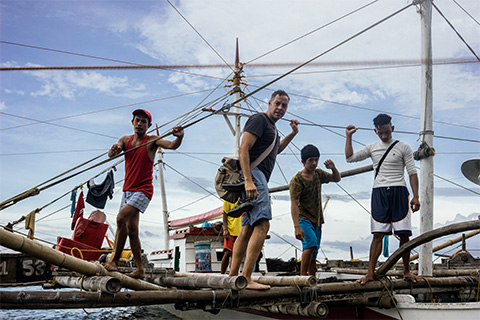
The Outlaw Ocean is a journalistic exploration of lawlessness at sea around the world. The project’s goal is to increase a sense of urgency by raising awareness and broadening the public’s understanding of what happens at sea, both above and below the waterline. This reporting touches on a diversity of abuses ranging from illegal and overfishing, arms trafficking at sea, human slavery, gun running, intentional dumping, murder of stowaways, thievery of ships and other topics.
In this guest blog post Ian Urbina, New York Times journalist and author of The Outlaw Ocean, reflects on how the oceans became such a big part of his life – and how he took the opportunity to parlay all that he had learned in his early experiences at sea into his new book. Humanity United is proud to have supported Ian’s reporting and The Outlaw Ocean. Learn more about the book here.
Since I was young, I’ve been enchanted by the sea, but it was not until one brutally cold Chicago winter that I acted on my fascination with this vast unknown. Five years into a doctoral program in history and anthropology at the University of Chicago, I decided to procrastinate on completing my dissertation by fleeing to Singapore for a temporary job as a deckhand on a marine research ship called the RV Heraclitus. For three months, the whole time I was there, the ship never left port, and I spent the time getting to know the crew from other ships docked nearby.
This stranded stint portside in Singapore offered my first real exposure to merchant seafarers and long-haul fishermen, and the experience left me riveted by what seemed like a transient tribe of people. These workers are largely invisible to anyone leading landlocked lifestyles. They have their own lingo, etiquette, superstitions, social hierarchy, codes of discipline, and, based on the stories they told me, catalogue of crimes and tradition of impunity. Theirs is also a world where lore holds as much sway as law.
What became especially clear in these conversations is that moving freight by sea is much cheaper than by air partly because international waters are so uncluttered by national bureaucracies and unconstrained by rules. This fact has given rise to all manner of unregulated activity, from tax sheltering to weapons stockpiling. There is, after all, a reason that the American government, for instance, chose international waters as the location for disassembling Syria’s chemical weapons arsenal, for conducting some of its terrorism-related detention and interrogation, and for disposing of Osama bin Laden’s body. Meanwhile, the fishing and shipping industries are as much victims of offshore lawlessness as they are beneficiaries and perpetrators of it.
I never finished my dissertation. Instead, I took a job in 2003 at The New York Times, and over the next decade, as I learned how to be a reporter, I occasionally and unsuccessfully pitched the notion of doing a series about this offshore world. In 2014, my editor embraced the proposal, and wisely nudged me toward focusing more on the people than the fish, delving primarily into the human rights and labor concerns, as the environmental issues would arise, as well, through that lens. The first story from the New York Times’ Outlaw Ocean series ran in the paper in July 2015, with an additional dozen or so pieces published in the subsequent year. I took an additional 15-month leave from the paper, starting in January 2017, to continue reporting for this book.
I set out to report on the people who work in this offshore world. More specifically, much of this reporting ended up focusing on trafficking and some of its various outcroppings: wage theft, sea slavery, debt bondage, murder, sex abuse and others.
To learn more, please watch the video here.